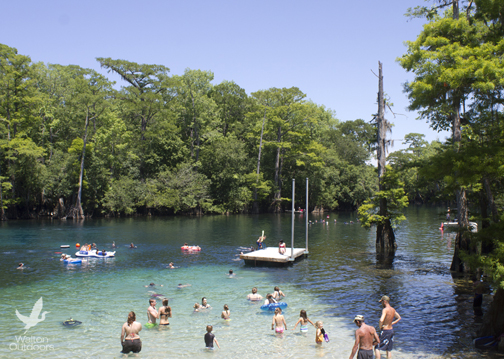
County, DEP seeking answers
Morrison Springs in northeast Walton County has been a popular swimming and diving destination for generations. The spring releases crystal clear water at a rate of 70 million gallons a day from a deep underground limestone vent. At a constant 68 degrees, Morrison Springs is the perfect place to cool off on a hot summer day.
In 2007 with funding from Northwest Florida Water Management District and the Department of Environmental Protection’s Spring Initiative program, the spring was developed into a park with restroom facilities, picnic areas and a boardwalk. Walton County now manages the facility.
Since early summer, something has been awry. The Florida Department of Health in Walton County (DOH) has been issuing health advisories consistently at Morrison Springs due to high bacteria readings in the water. Water samples are taken and analyzed by DOH for enteric bacteria (fecal coliform enterococci or E. coli) that normally inhabit the intestinal tract of humans and warm-blooded animals. The tests have indicated the presence of pathogens which may cause swimming related diseases including gastrointestinal disease, ear and eye ailments, and skin rashes and infections.
As an extra precaution, the Sheriff’s Office has closed the water to swimming and diving to help insure public safety.
Why? That is the burning question many people want an answer to.
According to Billy McKee, environmental manager for Walton County Public Works Division, the County is seeking answers and has called in other agencies to assist in finding the source.
“Due to the consistent and prolonged elevated bacteria levels, we have been working with the Health Department, Northwest Florida Water Management District, and the Florida Department of Environmental Protection to try to determine what might be causing the elevated levels of bacteria,” said McKee.
“At this time, samples are being taken and analyzed in the DEP laboratory to look for indicators to determine if the bacteria originates with people or animals. There is also an effort to perform some groundwater analysis around the septic system to determine if that system is contributing to the situation. I would like to point out that the septic system is a high performance aerobic system, is inspected regularly and appears to be functioning properly,” McKee continued.
According to Gary Maddox, geologist with the Department of Environmental Protection (DEP), there are many factors that could possibly play into the cause.
“Agriculture practices, high water levels from the river coming up the spring run and into the wetlands, human waste from old drain fields are just a few reasons, but only speculation,” Maddox said.
The DEP does deep water testing of Morrison Springs with a weighted tube four times a year for other factors such as nutrients. DEP had not tested for fecal bacteria until they teamed up the DOH a few months ago to test the spring vent for the bacteria. They have done two tests since September, and results have come back good, or very low bacteria levels according to Maddox.
Where are the answers? Hopefully some light will be shed on the subject come January 2014 according to Maddox.
“The lab in Tallahassee is now being certified to collect a DNA signature of the bacteria to determine if it is human or animal,” Maddox said.
Only time will tell where the source of the bacteria is coming from.
“Once we get the results of the ongoing analysis, we will work with the other agencies to determine the best course of action. If a definitive source is identified we can work to address correcting that problem. If nothing definitive comes out we will continue to work with the agencies to expand our analysis and look for other possible sources and hopefully resolution,” McKee said.
Click here to learn more about Morrison Springs.
